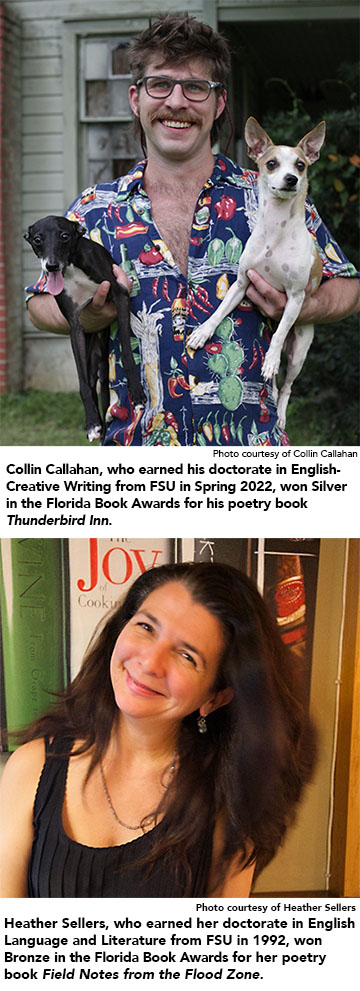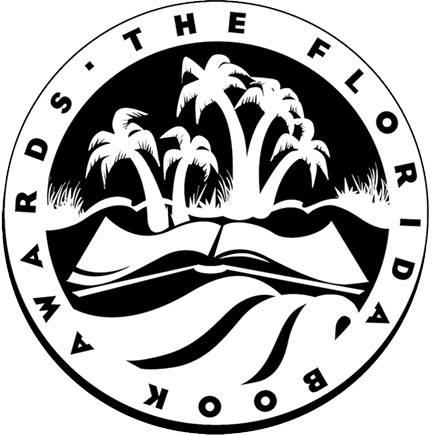English department alumni earn Florida Book Awards medals
By Bella Bozied
The Florida Book Awards recently recognized two Florida State University Department of English alumni within the Poetry section of the organization’s 2022 awards. Collin Callahan, who earned his doctorate in English-Creative Writing in Spring 2022, won the Silver Medal for his poetry book Thunderbird Inn, released in May 2022. Heather Sellers, who earned her doctorate in English Language and Literature in 1992, won the Bronze Medal for her poetry book Field Notes from the Flood Zone, released in April 2022.
FSU English Emeritus Professor John Fenstermaker and retired FSU Professor Wayne Wiegand created the Florida Book Awards in 2006 to honor authors who live in and write about Florida for their outstanding work. FSU Libraries currently coordinates the awards process, and winning authors from across the state were honored at a banquet on Thursday, April 20, in Tallahassee.
“In many respects, the breadth of award-winning books and authors reflects the variety of the state’s literary culture,” says Nikki Morse, director of the awards. “Since the program began, it has been the only state book awards program with a Spanish Language book category. This year also sees the introduction of a new award within the Poetry category, the Gold Medal for Poetry: Chapbooks.”
Sellers’ and Callahan’s collections each hold various characters and complexities, and they have similarities in being displayed in a poetic format and taking place in Florida.
“I was interested in characters that were kind of outcasts and weirdos, or perhaps dealing with addiction or mental illness,” says Callahan, who earned his Master of Fine Arts from the University of Arkansas and his Bachelor of Arts from the University of Iowa. “I just was trying to do a kind of different angle. I think poetry can be somewhat pretentious, so I kind of purposely am informal, and I don't think you would really have to open a dictionary up too many times reading the collection, which was on purpose.”
Callahan wrote the book description, which appears on the publisher's page for the publication. These briefs are not commonly written by their authors, but Callahan says when the publisher saw his mockup, they kept it.
In addition to earning her Ph.D. from FSU, Sellers attended the university for 10 years, earning both her Bachelor of Arts and Master of Fine Arts. One of her favorite memories from when she was at FSU is serving as the program assistant to the Director of Creative Writing Program at the time.
“I got to run the Spring Writers Festival,” Sellers says. “It was just a really great festival with a super fun community.”
Her award-winning publication, Field Notes From the Flood Zone, came to be from her intimate and constant thoughts she had in 2002 during the COVID-19 pandemic.
“I was in my house all the time, and I keep a daily journal,” she says. “And it just got very intense. This daily observation journal, just writing down these kind of long lines of everything I saw and everything I heard. And I think all that isolation, it makes you super focused. I felt more observant than my usual self.”
Her book of poems explores themes of family, the natural ecosystem, vulnerability as a young woman, among many other subjects.
“It's always going to be Florida: the landscape and the natural world, and the family,” Sellers says. “Those are my two subjects, and this piece is about those two things. It's one whole body of work. I'm always working on those same topics in different forms, but always the same subject matter.”
 She views all her writing pieces as one body of her work, especially in the themes that she stitches together. Sellers explains that from all the writing classes she has taken and taught throughout her life, she likes to question, “not what I want to say, but what can I learn about my craft.” This method is how she stays in “the right head space,” she says, especially when writing.
She views all her writing pieces as one body of her work, especially in the themes that she stitches together. Sellers explains that from all the writing classes she has taken and taught throughout her life, she likes to question, “not what I want to say, but what can I learn about my craft.” This method is how she stays in “the right head space,” she says, especially when writing.
While Sellers pulled inspiration from Florida itself and her garden during a time of isolation, Callahan's philosophies stem from elsewhere: notably, one of his favorite writers, Denis Johnson.
Johnson, who died in 2017, was an American writer and poet. His most successful novel, Tree of Smoke, won the 2007 National Book Award for Fiction. Callahan says much of his inspiration when creating Thunderbird Inn came from one of Johnson’s earlier works, the 1982 Incognito Lounge.
Callahan further spells out the inspiration he gains from collaborating with other poets and from knowing that he feels best when writing poetry.
“[My poems] lean on narrative, they lean on characters. And, hopefully, almost have this cinematic quality of a certain scene and place and time,” he says. “Often the poems are situated in specific place, like the Stardust Bowling Alley or the Candlelight Motel.”
After a 10-year writing process, Callahan was satisfied with the blueprint for Thunderbird Inn. Resisting the temptation for a redemptive arc but still walking the line of creating likable characters, he says that cultivating a distinct voice is incredibly important.
“I think what's kind of fun about poems is they can be these kind of like conversations with the dead, or just, perhaps, with people that you've lost contact with,” Callahan says.
Thunderbird Inn was the winner of the 2021 Minds on Fire Open Prize along with its recent honor. Callahan also read on May 11 for The Dali Series at The Salvador Dali Art Museum in Saint Petersburg, Florida.
The two Florida Book Award winners have FSU and English department roots, and they share more than just a passion for poetry, similarities that can be found in their teaching methods.
After her academic accomplishments at FSU, Sellers had several teaching appointments: the University of Texas-San Antonio; St. Lawrence University in Canton, New York; and, for 18 years, at Hope College in Holland, Michigan. The University of South Florida offered Sellers a faculty position in 2013. One of her former professors at FSU, Hunt Hawkins, who taught English at FSU from 1978 until the early 2000s, was chair of USF’s Department of English at the time Sellers’ hiring.
Sellers had known Hawkins since she was 17 years old, and she called her joining the USF faculty as a “full circle” moment, expressing how excited she was to work again with Hawkins. Sellers now directs USF’s Creative Writing Master of Fine Arts and Undergraduate Program. While the position is a full-time job, she finds that working with students is ideal, which has been her perspective throughout her time as a faculty member.
“Teaching makes me stay in touch with always wanting to learn new things to teach my students,” Sellers says. “If I can discover new things about the craft of writing, it keeps me excited to keep going back to the classroom. If you're still excited and learning yourself, then I think you can bring that sense of the living to the classroom.”
As she further discusses her classroom experiences, Sellers discloses her prosopagnosia condition, also known as face blindness. Diagnosed later in life, the condition makes it impossible for Sellers to recognize faces. But she does not let that affect her teaching.
“On the first day, when I hand out the syllabus, I do a full explanation and ask them to wear name tags,” Sellers explains. “I bring out the name tags and Sharpies and everybody wears one, and you know what? They love it because you can't remember the names of everybody in your class.”
Sharing her condition with students “has made my classroom space really beautiful.”
“When you admit, as a teacher, that you are vulnerable and you need the student’s help,” she says, “I just think it really levels the playing field and creates a space where we can be vulnerable together in a safe way."
She adapts to her condition in a way that encourages community within her classes. Sellers works within her teaching style, writing ways, and other personal perspectives to keep a growth mindset.
“With every class, every day, I like to stay in touch with, ‘What can I learn? What can I learn from every mistake?’” Sellers says.
Sellers has won various awards during her teaching career. At Hope College, in 2011, she was awarded the H.O.P.E. Professor of the Year. In 2017, she earned a USF Teaching Award, and most recently, in 2022, USF honored her with the Kosove Award for Distinguished Undergraduate Teaching and Service.
Callahan gained teaching experience while going through the creative writing doctoral program at FSU, and he recently finished a year-long visiting faculty appointment for the department, completing the teaching of four courses of ENC 2135 Research, Genre, and Context.
“Something about it being a required course maybe makes it a little bit more difficult,” Callahan says. “One thing I've learned about teaching is you don't have to be entertaining. But if you're not, you will get less participation. So, I try to pick topics and conversations that people care about.”
Callahan discovered an appreciation for engaging with students through his involvement in FSU’s Creative Writing Program and his funded Ph.D. program. Teaching, he adds, makes anyone's writing better. Callahan hopes to settle into a teaching job in his preferred fields of creative writing or poetry, but no matter what his main profession becomes, he will never stop writing.
“I don't think you necessarily have to be in the English field, but I think it's great if you are,” he says. “You just have to read the best if you want to get in the ring in the first place.”
The Florida Book Award-winning pieces are showcased within an exhibit on the third floor of Strozier Library at FSU as well as on permanent display in the library at the Governor's Mansion in Tallahassee. Even though Sellers and Callahan became university alumni at different times, they both display the success that can follow any English department graduate.
Bella Bozied is a double major in English-Editing, Writing, and Media as well as Information, Communication, and Technology.
Follow the English department on Instagram @fsuenglish; on Facebook facebook.com/fsuenglishdepartment/; and Twitter, @fsu_englishdept
